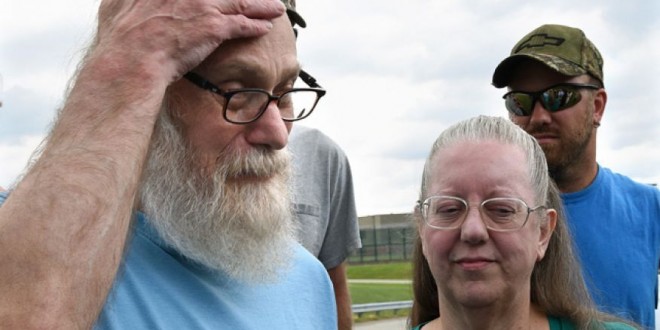DNA evidence cleared Lewis Fogle of participation in the rape and murder of a 15-year-old, and he was released last month before a formal decision on his charges.
That freedom became permanent Monday as District Attorney Patrick Dougherty declared he would not seek to retry Fogle in the death of Deann Katherine Long.
Dougherty filed a motion before visiting Senior Judge David Grine to dismiss the case against Fogle with prejudice, meaning that “this case is now over as far as Mr. Fogle’s involvement,” Dougherty said.
After re-examining evidence and reinterviewing witnesses in the case, Dougherty said, “We do not have sufficient grounds to move forward against Mr. Fogle. … We were able to determine that Mr. Fogle’s DNA was not present on the victim at the time of the incident.”
Lewis Fogle, 64, who has been living with his wife, Deb, in Indiana since his Aug. 13 release from SCI-Pine Grove, had declared his innocence throughout his incarceration.
After the final dismissal of the case against him, Lewis Fogle told reporters he’d completed his own legal research in prison before obtaining assistance from the Innocence Project, a nonprofit organization committed to exonerating wrongly convicted people.
“It pays off if you don’t give up,” Lewis Fogle said.
Innocence Project officials noted initial DNA testing using evidence available in 2010 was inconclusive. Managing attorney David Loftis said the organization later uncovered key evidence — pubic hair combings from the victim that could not be linked to Lewis Fogle through DNA testing.
According to the Innocence Project, the evidence had been in the custody of authorities but had not been inventoried adequately.
With Lewis Fogle’s removal as a suspect in the 1976 murder, Dougherty said, his office is “treating this as an open homicide case. We’re looking to explore any and all leads.”
Dougherty said he’d spoken to Long’s family about the legal steps resulting in Lewis Fogle’s freedom. “Obviously, they’re disappointed,” Dougherty said, but he added that the family understood the implications of the new evidence.
Dougherty indicated he believes Lewis Fogle can shed light on the case. “I believe he knows more,” the district attorney said. “Do I think he’s without blame? I can’t say he was or was not.”
Lewis Fogle said he has spoken with the victim’s family and hoped the murder would be solved, adding, “I wish that had never taken place in the first place.”
The victim was at her parents’ home along Route 580 on July 30 when a man knocked on the door, claiming her older brother Leonard had been in a car accident, the victim’s sister, Lola Long, said in a 2011 Tribune-Review interview.
The teenager got in the car with the man, and her body was found the next day, her sister said.
It was not until five years after the murder that state police arrested Fogle, along with his brother, Dennis Fogle, Joseph Victor Receskey and John Robert Lynch. Only Lewis Fogle, who was tried separately, was convicted in Long’s death.
In 2010, Dennis Fogle pleaded guilty to sexually assaulting a 15-year-old boy in Mifflin County. He was sentenced to five to 10 years in prison. Receskey died in March 2010 at 59. Lynch’s whereabouts could not be determined.
https://www.youtube.com/watch?v=SLtK-D2vXxY
Innocence Project attorneys have criticized the use of testimony from prison informants in the prosecution of Lewis Fogle.
Karen Thompson, staff attorney for the organization, additionally decried Pennsylvania’s lack of a standard process for belatedly exonerated defendants to seek compensation.
“All people unjustly convicted of crimes should be compensated for the years lost, and Pennsylvania currently doesn’t have a mechanism for doing so,” she said.
Now that he is outside of prison walls, Lewis Fogle said his first concern is getting to know the family he’s long been separated from — including two granddaughters ages 17 and 1 1⁄2.
He’s enjoyed “getting used to eating real food again,” after a prison diet including suet and chicken, not steak.
But he expressed concern about making ends meet now that he is older and not up to speed with today’s job market.
“What am I going to do for the rest of my life?” he asked.
With the help of two artists who provided him photos of local scenes for inspiration, Fogle took up painting while in prison, a creative pastime he found calming.
He estimated that he’s done about 100 paintings and has sold all but 23. He said he is considering teaching lessons in the art form.
He said selling paintings may supplement his income, “but it’s not enough to live on.”
Adapting to today’s social norms after three decades behind bars is a challenge, Lewis Fogle said.
“It’s like stepping out onto Mars,” he said. “Everything is changed. I don’t even know how to work on a car anymore.”
Lewis Fogle said he’s acquired a cellphone, but, “using it is another thing.”
Agencies/Canadajournal
 Canada Journal – News of the World Articles and videos to bring you the biggest Canadian news stories from across the country every day
Canada Journal – News of the World Articles and videos to bring you the biggest Canadian news stories from across the country every day



